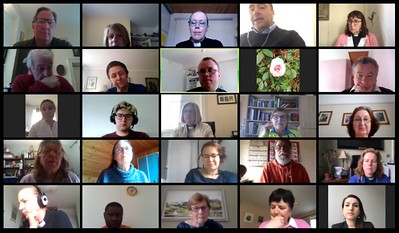Members of faith communities in Dublin and Finland gathered online on last Friday morning (May 15) for a webinar to share information on how they are dealing with the Covid–19 crisis.
The webinar, which was attended by more than 40 people, was hosted by Dublin City Interfaith Forum and the Anglican Church in Finland and the panel discussion was chaired by Archbishop Michael Jackson.
Opening the discussion, Archbishop Jackson recalled the days running up to lockdown in Ireland. “The idea of gathering for worship, all that changed immediately. So we had a move from the tangible to the virtual and I hope we didn’t lose the symbolical,” he said. The Archbishop suggested that the lockdown had been a tremendously theological time in which to live. “There has been an opportunity to dig deep into the core of our faith. Digging together we can find values that we have in common,” he said. He added that there had also been bereavement and trauma, domestic abuse, the impact of de–socialisation on children and the virtual disintegration of the economy.
The Revd Katri Kuusikallio, executive director of the National Forum for Cooperation of Religions, Finland, said their first reaction to the crisis was to strengthen their communications, both internal and external. She explained that the Finnish government had strong trust in the country’s religious leaders and asked her organisation to share information. The togetherness of church leaders over the years paid off as they were able to make common statements. “This exceptional time has really shown the power of interfaith dialogue and cooperation. We can see our commonality,” she commented.
Chairperson of Dublin City Interfaith Forum, Hilary Abrahamson, said DCIF acted swiftly and issued a statement promoting unity and speaking with one voice. Hilary, who is a member of the Dublin Jewish Progressive Congregation, reported that Synagogues closed on March 5 and although people were shocked, it was important to adhere to the government guidelines. “From the Jewish perspective, we have a small community. We have had most of our services online although the Orthodox cannot have services online on Shabbat. Our funerals are vastly curtailed… For older people, it has been wonderful that they can attend events online,” she explained.
Fr Alan Hilliard of TU (Technical University) Dublin’s Pastoral Care and Chaplaincy Service, said it was a very strange time to be a university chaplain. In conjunction with some students he came up with six types of pain produced by the pandemic: the pain of isolation, the pain of disconnection, the pain of pain and suffering, the pain of anarchy, the pain of death and the pain of diminishment. “In ministry you have to start with what is going on. It is at the heart of our faith to listen to God and name our pain before we respond. When we look at these six pains we begin to see how to work in this situation,” he said.
In the case of isolation he suggested that we can let our spaces be empty and fill them with rituals of care. We are disconnected but as Christians we can remind ourselves that we will be connected again. The anarchy, he said, is of those who don’t care about others and who feel their rights are more important that the rites of the community.
The Revd Eeva–Kaisa Heikura, of the Evangelical Lutheran Church in Finland, outlined what her Church had done. She said normally Pastors would visit hospitals but now they offered support by phone. They now gathered for church digitally and she forecast that there would be increase in online worship in the future. She said every parish was working to find people who were at risk of being ignored and many parishioners were volunteering in foodbanks. “Pastors are being innovative and active in supporting those in quarantine and streaming worship online on websites and social media channels. This is something I am very proud of… The power of social media and traditional media is strong and our job as communicators is to communicate faith, hope and love,” she commented. She said there were challenges in getting the message of faith communities across in a complicated media world.
The Revd Tuomas Mäkipää of Anglican Church in Finland, which is part of the Church of England’s Diocese in Europe, outlined the response of his Church to the pandemic. While the number of Anglicans in Finland is small he said they benefited from being part of the larger Diocese in Europe and learned from the experiences of southern Europe. They cancelled church gatherings before the Finnish government advised it and they are now starting to look into the new normal based on the experience of the south of the diocese. He said the main duty for them was to give pastoral support and disseminate information. Many members of the Anglican Church in Finland were not Finnish speakers and therefore the Church played an important role in communication. He spoke of the global nature of churches in recognising all people. “Can we and should we recognise the variety of people in our society? Here religious communities have a role to play in that we are global communities. In the online world we are not speaking to our own nations but to the global audience,” he explained.
Archbishop Jackson spoke of a new theology which might emerge in a post pandemic world. This could be a theology of compassion and hope. It could speak to people hitting a brick wall of trauma, to people who have not expressed their grief, to the six pains outlined by Fr Hilliard. It could address those who prefer to engage in worship online rather than engage with people, those who like to worship at home and pick and choose their parish. He hoped that a theology beyond the coronavirus could be written by participants in Dublin and Helsinki.
DraggedImage.7d80c89f82b24963894202f8961fbb11.png



